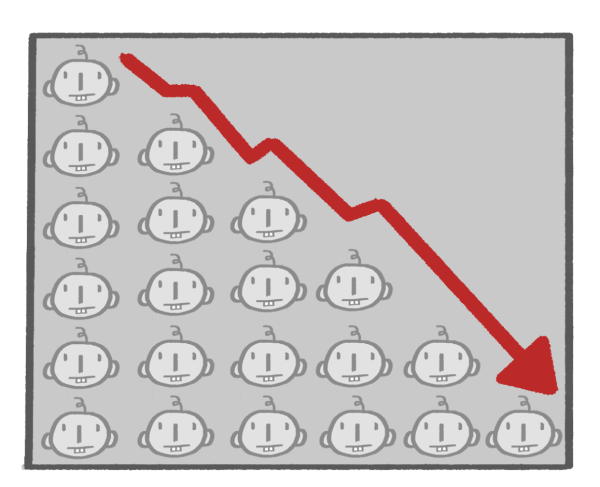
The political and economic state of our country has always had a deeply intertwined relationship with birth rates. For instance, in the wake of World War II a combination of domestic prosperity and the influx of millions of returning soldiers saw a dramatic increase in the number of children born, leading to what we now retrospectively call “the baby boom.” But while the detail of how many babies are born in this or that year might seem irrelevant at first, the reality is that even small changes to figures like these can have meaningful effects both on our country at large and at LM.
2008 brought, alongside blockbuster hits Twilight and The Dark Knight, the worst financial crisis since the great depression. While the recession’s exact causes are disputed, the general economic consensus is that the rapid decline of housing prices eventually led to record-high levels of mortgage defaultment, as the amount that buyers borrowed soon came to be greater than the actual value of the house they had bought. The effects of this would soon ripple throughout the broader American economy through the existence of the increasingly popular Mortgage Backed Security. This is a form of asset-backed security that exists as a large bundle of private mortgages. In essence, their performance is largely dependent on the value of average housing prices, meaning that when home prices declined precipitously, they collapsed alongside them. This eventually came to fruition in October 2008, when the S&P fell by more than twenty percent alongside similar international declines.
Unemployment rose. Markets fell. The economy was dead, and recovery soon turned to rigor mortis. In the wake of deteriorating economic conditions, would-be parents were forced to put their dreams aside, and consequently, fertility rates declined from 2.12 in 2007 to 1.8 in 2008, according to the World Economic Forum—below the level needed to sustain consistent population growth. The US birth rate had, after years of steady increase, fell off a cliff. In fact, over the next five years, two million fewer babies were born than would have if pre-recession economic growth had continued. Amid the 19 trillion dollars lost by American households, few noticed the silent diminution of the next generation.
So why does this actually matter? Well, the effects of this so-called “demographic cliff” are clearest in the evolving nature of college admissions. Students born in 2008 and 2009, or current underclassmen, are going to be entering a college landscape more forgiving than students born pre-recession. A smaller population means proportionally fewer applicants, with some estimates finding that total enrollment is predicted to decrease by fifteen percent. When that happens, colleges and universities are left with two choices—either raise acceptance rates or face insolvency.
But while the Demographic Cliff might seem appealing to students, it paints a grim picture for the future of individual colleges. Harvard, Princeton, Stanford—the bastions of elite education will abseil the cliff with ease. But for many smaller, less prestigious institutions, the future contains little more than a brief, painful splat.
For many rural communities, the local college is an economic liferaft in a steadily deindustrializing nation. In many cases, even basic services like healthcare exist only through college facilities. Employment opportunities within the colleges and the buying power of matriculating students are key to the vitality of these communities, and as the colleges dry up, so will the towns themselves. In essence, the effects of the Demographic Cliff stand poised to exacerbate existing socio-economic disparities — further entrenching an education system that already caters to the wealthy first and foremost.
So what does it all mean for the average LM student? Well, for everyone applying to college right now, I have some bad news to break; you made the regrettable choice of being born in a good economy. For the underclassman, it’s a brighter picture. Deserved or not, your time in the admissions gauntlet might be just a little bit easier.
And for all the aspiring parents reading this—try to have your kids in a recession.




